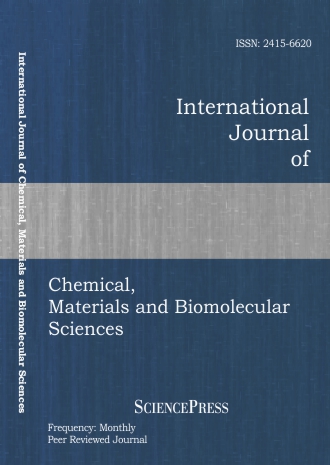
Scholarly
Volume:11, Issue: 9, 2017 Page No: 639 - 644
International Journal of Chemical, Materials and Biomolecular Sciences
ISSN: 2415-6620
309 Downloads
Preparation and Characterization of Pectin Based Proton Exchange Membranes Derived by Solution Casting Method for Direct Methanol Fuel Cells
Direct methanol fuel cells (DMFCs) are considered to be one of the most promising candidates for portable and stationary applications in the view of their advantages such as high energy density, easy manipulation, high efficiency and they operate with liquid fuel which could be used without requiring any fuel-processing units. Electrolyte membrane of DMFC plays a key role as a proton conductor as well as a separator between electrodes. Increasing concern over environmental protection, biopolymers gain tremendous interest owing to their eco-friendly bio-degradable nature. Pectin is a natural anionic polysaccharide which plays an essential part in regulating mechanical behavior of plant cell wall and it is extracted from outer cells of most of the plants. The aim of this study is to develop and demonstrate pectin based polymer composite membranes as methanol impermeable polymer electrolyte membranes for DMFCs. Pectin based nanocomposites membranes are prepared by solution-casting technique wherein pectin is blended with chitosan followed by the addition of optimal amount of sulphonic acid modified Titanium dioxide nanoparticle (S-TiO2). Nanocomposite membranes are characterized by Fourier Transform-Infra Red spectroscopy, Scanning electron microscopy, and Energy dispersive spectroscopy analyses. Proton conductivity and methanol permeability are determined into order to evaluate their suitability for DMFC application. Pectin-chitosan blends endow with a flexible polymeric network which is appropriate to disperse rigid S-TiO2 nanoparticles. Resulting nanocomposite membranes possess adequate thermo-mechanical stabilities as well as high charge-density per unit volume. Pectin-chitosan natural polymeric nanocomposite comprising optimal S-TiO2 exhibits good electrochemical selectivity and therefore desirable for DMFC application.
Authors:
References:
[1] V. Neburchilov, J. Martin, H. Wang, J. Zhang, “A review of polymer electrolyte membranes for direct methanol fuel cells,” J. Power Sources., vol.169, no., pp. 221–238, Apr. 2007.